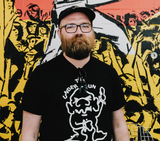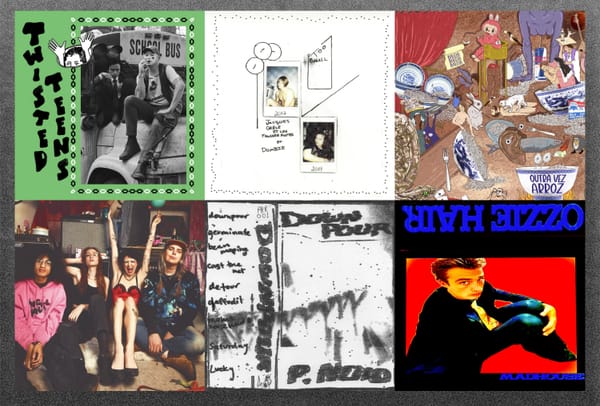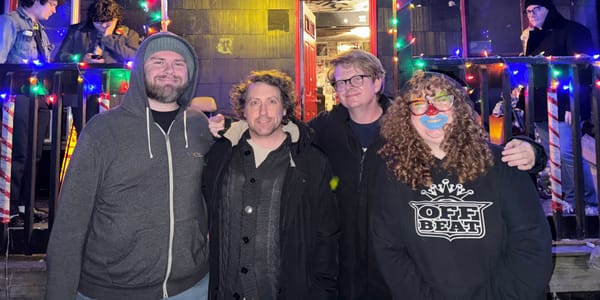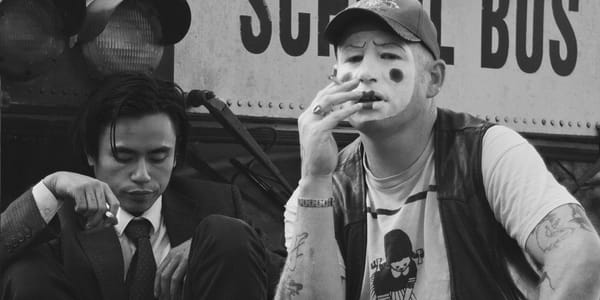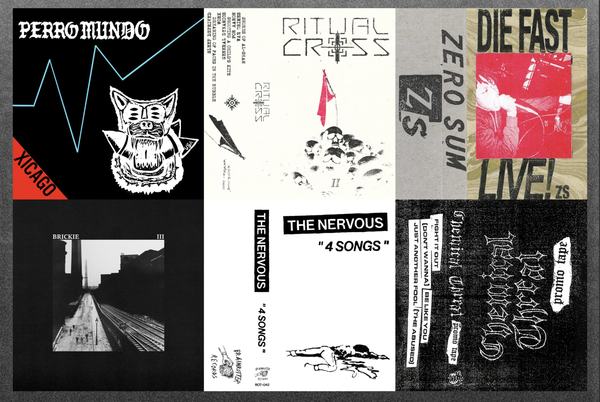in the van with s.h.i.t. in japan
On tour behind their new album For a Better World, the Toronto band discusses finding community through fury and almost pulling the plug.
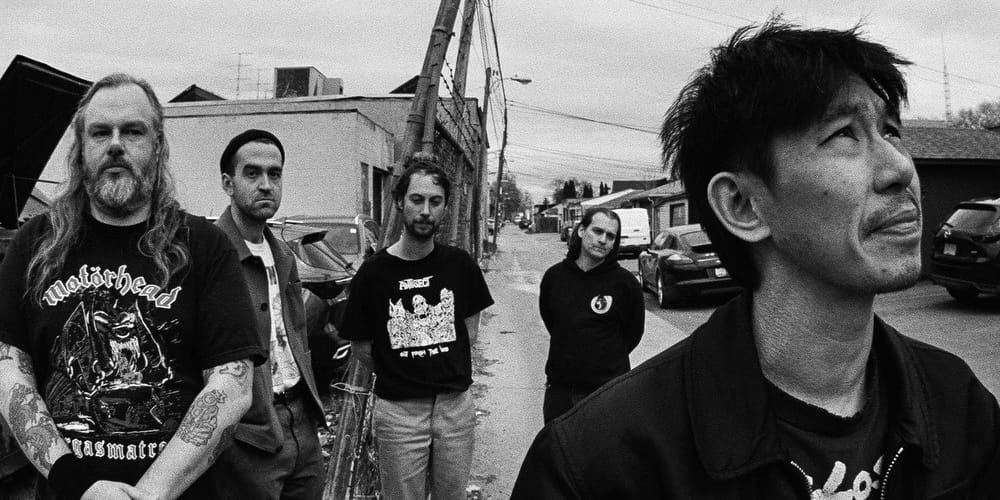
S.H.I.T. are on the road from Sendai to Tokyo in the middle of a tour of Japan. The Toronto collective’s plan to do an interview about their new album For a Better World, in these exact circumstances, is far from ideal. Winding through mountains, the call drops twice mid-sentence. They pass phones back and forth, leading to some “wait who just said that part” follow-ups. The upside is that they’re all together. With Ryan Tong living in the UK and Spoiler in Montreal, it’s an opportunity for the entire band to reflect on one of their best records to date. (Three of the five members often refrain from speaking.)
It’s a typical tour in some ways: “Right now it’s been a lot of in the van shit,” says Greg Benedetto. “It’s the Japanese version of the American tour where you wake up and nothing’s open when you have to leave. You get in the van, you see a couple rest stops.” They’ve stolen a few moments—a cemetery walk, coffee at the fish market. “Haven’t eaten the same meal twice,” two members of the band boast. The crowds pack the rooms from the moment doors open; they’re greeted by an enthusiastic and supportive DIY scene.
It makes sense: S.H.I.T. is an institution. For over a decade, this band’s records—the self-released ones, the Bandcamp live tapes and demos, the comp appearances, and the stuff on Iron Lung and La Vida Es Un Mus—have arrived with a raw, intense, harrowing d-beat guarantee. Impossibly, For a Better World ratchets the tension on their reliably intense approach. “Stolen land soaked with innocent blood,” screams Ryan Tong, “as the Lockheed bombs fall from the sky above. They were paid for by you and me: corporate funded killing technology.”
With a lot of road ahead of them, they spent a half hour in the van speaking over the spotty connection about the logistics of being a band spread out across the globe, the pointed and political nature of their work, finding community through the anger they express, and the long rocky road to the new album’s completion.
Between the previous work and the new record, what’s the biggest change between the previous work and this one?
Ryan: Well, these songs are not new to use. We tried to write and record them for a very long time. As far back as the pandemic, I think these songs were written. I think every time we tried to put together a recording or get together to do it, it hasn’t really turned out the way we wanted it to. I think for me what’s different about these last batch of songs is that we got together and did them all together as a band in a very long time in this configuration. The recording process was different for me. That stands out. We all got together in Toronto during the solar eclipse and wrote and recorded all the songs together, and it felt really good.
I’m curious, how does it feel to physically perform and express a song like “Kill the Fuckers”?
Ryan: That song came together literally in the studio when we were together. I was trying to finish up lyrics for that particular song and I think Greg brought up the quote. It was something like, “The Earth’s not dying, it’s being killed, [and those who are killing it have names and addresses].”
Greg: It’s a Utah Phillips quote. As with most things, I was like, “How can we simplify this and make it stupider?”
Ryan: To me, and I imagine a lot of people living in the world today, everything is so extreme. Oftentimes, we feel really helpless with these giant superpowers enacting these atrocities and having them unfold in front of us day to day, it really puts you in a fucked up space. I think the song represents that feeling—of feeling helpless and wanting to just lash out in a very violent way.
It feels like there’s a good bit of that throughout the record. When you talk about giant superpowers enacting atrocities, I think of “Corporate Funded Killing Technology.”
Ryan: Yeah, that song is definitely about that, but I think it’s also more importantly about our complicity in that and how we’re wrapped up in that just by being a part of it. I think it’s very easy to point the finger and say, “Oh these people with all the power are wholly responsible for it,” and they definitely are in a big way, but they’re using our money and we’re complicit in it as well.
S.H.I.T. exists in this tradition of punk and hardcore that steeps itself in the hell of real life. How do you feel about the other realm of punk, bands that largely just make escapist party music?
Greg: I guess I don’t really care too much. I think what you put out into the world invites the company you keep to some degree. We don’t get asked to play party punk shows, sadly, because we’re a pretty funny group of guys who like to party. It’s been funny to me observing ourselves spending most of the past few days drinking, hanging out and having a good time, then getting up on stage and playing what is effectively dramatically over-serious music. I’d say we’re alarmed and disturbed at the state of the world right now for many reasons expressed in our music. That said, maybe something that gets lost in the despair of the music and is worth communicating. We think it’s important that we always try to find and create hope and love for ourselves and others. So yes, the music is serious. It’s angry and aggressive, but that’s always been a means of inviting people into a community, be it through any of the spaces we’ve run or festivals we’ve booked. We have to believe a better world is possible and it’s up to any of us to create that however we can. By making angry music, you meet other people that are also angry about the same things and you can start taking care of and supporting each other from there.
What is your all’s writing process like?
Greg: These songs took forever to get to their final form, and in some cases, their final form is not entirely different from their early stages. We kind of just feel it out together most of the time. There’s a bit of a process of determining what makes sense for the band and what doesn’t. Sometimes we play a song for two years and then we’re like, “You know what? That song actually fucking sucks.” I think of all these songs, the first one we wrote actually got binned before even the first session. I think we called it “Frost’s Revenge” or something?
Someone in the back of the van: Yeah, that song sucked.
Greg: That song sucked! There was a song on the No Deal comp [“The War on You”]; we did a recording session in 2021 where we recorded five songs. We picked that one because we thought it was the best. Played it a few times, then we were like “that song kind of sucks” and we stopped playing it. Then on the new record, there’s a song called “Haunted.” It was originally recorded in the same session as “War on You,” but we hated it after that. We revisited the original version, and when we were practicing to record this LP, we were like, “You know what, a couple changes to this might make it a lot better.”
That has to be a benefit to being a band for a long ass time is you have this backlog of material you can tweak and rethink.
Greg: It’s also its own trap, right? You’re trying to figure out how to write things that still sound like you but also not sound like you. You also get bored playing certain things over and over and over again. I’m better at my instrument than I was when the band started, [to someone else in the van] maybe you are, but it’s a blessing and a curse. Sometimes you end up having to play songs because people want to hear them even though you don’t necessarily want to play them.
With you guys in different places, did it ever feel like the band was over?
Greg: I mean I feel like it feels that way maybe every few months and it has for a long time. Some of these songs are quite old. There are probably like three versions of “Imminent Destruction” at this point. At every point we’d get a recording back and we’d be like, “Fuck, I don’t know.” Everybody would be in different places and communication’s particularly challenging sometimes. Then you just get to a point where it’s like “well this is hard to do and also not necessarily fun.” We’re all very grateful for the fact that seemingly when the five of us get in a room, we do really enjoy it quite a bit. I know maybe that’s not the case for most bands but that is sort of the driving force. Every once in a while we remind ourselves that yeah, being in a band for 12 years seems fucking silly sometimes but the reason we get to do things like come to Japan is because we do it. And then doing Japan is also fun! It’s not like work or suffering. We get to play these songs to people and they enjoy them. So the short answer is every few months all of us want to quit. I think in the process of creating this record everyone wanted to quit. I know I said it.
Ryan: This record in particular, for me at least, gave the band a little bit more energy. Having it come together the way it did and us being really happy with it and being really excited to put it into the world, I think that definitely gave us a lot more energy. Also, coming to Japan is fucking amazing.
see/saw is a reader-supported publication. If you enjoyed this article, please consider a subscription to support this independent punk journalism operation.

